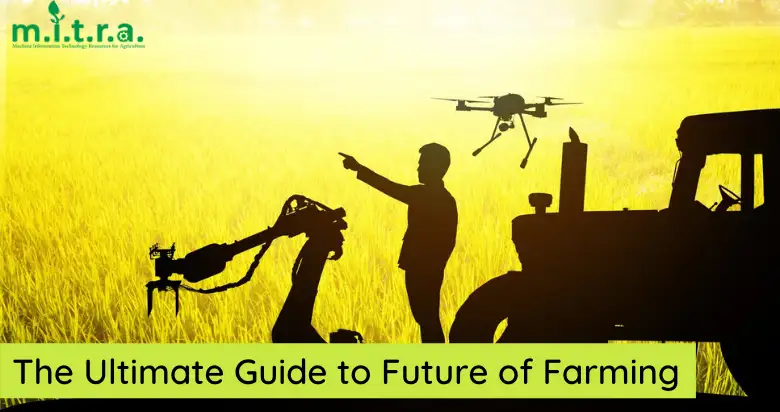What are the possibilities for agriculture in the years to come? Many people only worry about this issue for a few months at a time, perhaps when asparagus is in season or when the price of milk or eggs might change due to the state of the economy.
As farmers and ranchers plan their harvest and crop rotations, manage their livestock, or put-up new business ideas, they tend to think in terms of years. Many environmental and biological scientists and agroecologists are attempting to predict what agriculture will look like in 50 or 75 years, as well as the challenges and opportunities that the changing environmental and climate landscape will present and the technological innovations required to ensure success in the future. Herbicides, fungicides, insecticides, and micronutrients can be sprayed or dusted onto plants using an agriculture sprayer.
The Future of Farming
There is a good chance that the future farmers will be doing things quite a deal differently than they do now. Here are some thoughts to consider as we consider these future farmers:
- How and where will farmers of today and tomorrow raise and cultivate their food in the years to come?
- What techniques of manufacturing will they be employing?
- How will their physical and political limitations influence their decision-making?
Drought, floods, and shifting pest and disease patterns are just a few of the severe weather occurrences that farmers throughout the country are dealing with due to climate change. A future climate cannot be predicted with certainty, yet key agricultural growing regions have already begun to alter. As a result, future farmers will almost certainly cultivate a different variety of crops in various parts of the country than their predecessors. Because decades of study focusing on present commodities and growing locations will ultimately become obsolete, this is important for agricultural scientists.
Tractor trailed sprayer is a type of air-assisted sprayer used in vineyards and orchards across the world.We cannot expect our future farmers to succeed unless they have access to localized plant varieties that are well-suited to the climate and disease and pest threats they experience. Plant and animal breeders must thus participate in long-term research to develop new types that reflect the interests, motivations, and demands of the future farmer and markets and climatic scenarios with which they will have to compete. Agriculture Sprayer machine is widely used in agriculture, horticulture, sericulture, plantations, forestry, and garden.
The Future of Eating
What will tomorrow’s consumers eat if America’s major growing regions and farmers’
future crops are moving? Are future farmers prepared to fulfill rising consumer
demand for organic and locally grown food in rural and urban locations? Pest
controllers use sprayers and orchard sprayer, but the orchard sprayer is
more efficient.
This was the question researchers in the Northeast asked themselves as they tried to
figure out how farmers might fulfill rising customer demand for locally farmed
flour. Small Grains Breeding Program (Cornell University) and other
organizations and research partners helped bring together the scientific and
commercial parts to kick start a nascent grains economy in the Northeast.
Agriculturalists in the Northeast were ill-equipped to meet the increased demand for locally
manufactured flour since most wheat used in flour is bred for the northern
plains and northwest of the United States, where it grows best.
Making Decisions Now to Improve Our Future
Farmers (and consumers) must actively participate in policy discussions that shape our agricultural research agenda if we are to ensure a profitable and sustainable future. We can improve agricultural research and policy quality and sustainability by incorporating farmer input into current and future research objectives.
NSAC helped design one of the earliest government initiatives, Sustainable Agriculture Research and Education (SARE). SARE equips farmers to perform on-farm research. SARE is the USDA’s only farmer-driven research program.
However, some of the research discoveries and technologies created with SARE’s funding have significantly impacted the way we farm in our nation. Cover crops, for example, began with a tiny SARE subsidy decades ago and are now widely used by conventional and organic farmers equally. These two government research initiatives are the only ones that consistently prioritize farmer-driven research. As Congress considers the upcoming farm bill’s Research Title and yearly funds for USDA research programs, these two cornerstone competitive grant programs must be discussed. However, we must lose sight of the people — farmers and consumers – and their current and future needs and wants.
Onward
It’s usually said that today’s study helps shape tomorrow’s food and agricultural systems. That emphasizes asking the appropriate questions to the right people. All farmers, but especially young and starting farmers, must be part of America’s agricultural sustainability discourse. It is vital to understand the sorts of farms that new and beginning farmers are establishing today and want to start in the future and the economic, policy, and environmental issues they will encounter.
American agriculture has no future unless we consider the people who make it possible. We must better comprehend the future farmers’ motives, economic drives, and political realities, as they will be in charge of our nation’s food supply and natural resources for decades. These operations necessitate particular instruments, such as the agriculture mist blower, which is essential for preserving crops, as you are well known.

